- Home
- slideshows
- miscellaneous
- 14 foods with wonderfully healthy fats that you should add to your plate
14 foods with wonderfully healthy fats that you should add to your plate
Whole eggs

Oatmeal

Most people don't think of oatmeal as a fat-rich food, but part of the reason the breakfast keeps people full is that it's loaded with more fat than most other grains — mostly the good polyunsaturated and monounsaturated kinds.
Oats are also a great way to get more amino acids, as well as vitamins and minerals like B6 and iron. That's all in addition to the protein and calcium oats are known to deliver.
Spirulina

Spirulina is an ancient type of blue-green sea algae that has developed a cult following as a "superfood." It's often added to smoothies as a dark green powder.
The algae was a source of sustenance long before the age of blenders: The Aztecs dried and ate it in Mexico as early as the 1600s.
The cyanobacteria is rich in protein and iron, and also boasts a punch of amino acids and fat. Just two tablespoons of spirulina have a gram of fat. That's not nearly as much fat as an egg or piece of meat contains, but it's impressive for a piece of seaweed.
But be careful where you get your algae from — the National Institutes of Health warns that some contaminated spirulina can cause liver damage and harbor toxic metals and bacteria.
Seeds, especially chia, flax, and sesame.
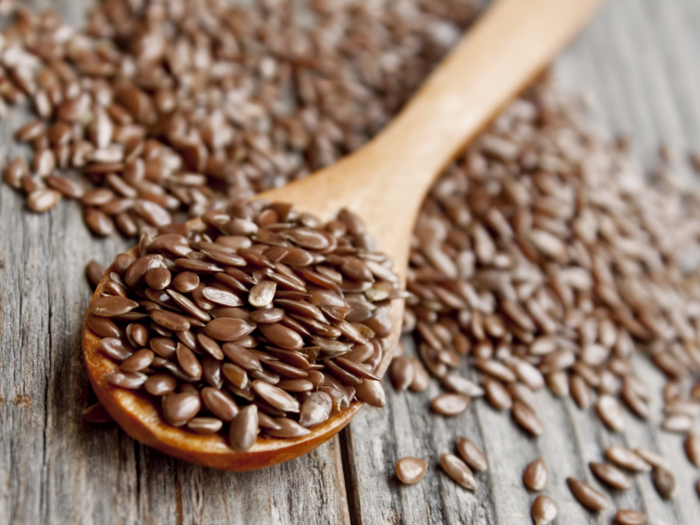
Seeds aren't just for the birds.
Options like ground flax, sesame, sunflower seeds, and chia seeds are all high in polyunsaturated fats and filled with omega-3s that can help lower your bad (LDL) cholesterol levels.
Just two tablespoons of chia seeds will give you 7 grams of unsaturated fat, and can also help lower cholesterol, decrease inflammation, and regulate blood pressure. Because chia seeds break apart easily when we digest them, you don't need to grind them up like flax.
Of course, since seeds are small, it can be easy to overdo it; think of them more as replacements for less healthy saturated fats in your diet, and consume them in moderation.
Coconut oil

Coconut oil is high in saturated fat, but it's not terrible for you.
About 50% of the fatty acid content in coconut oil is lauric acid, a kind that gets sent to the liver and used as energy by the brain and the body, instead of being stored as excess fat.
Coconut oil can can also help fill you up in a hurry, while the medium-chain triglycerides inside (MCTs) help you burn off more fat around your waistline, and lose weight all over. There's even some evidence that the oil may help patients with breast and uterine cancers.
Still, nutrition experts like doctor Walter Willett at the Harvard School of Public Health caution that coconut oil should probably be used sparingly in your diet, since the health benefits of unsaturated fats and oils are more proven.
Nuts, especially walnuts
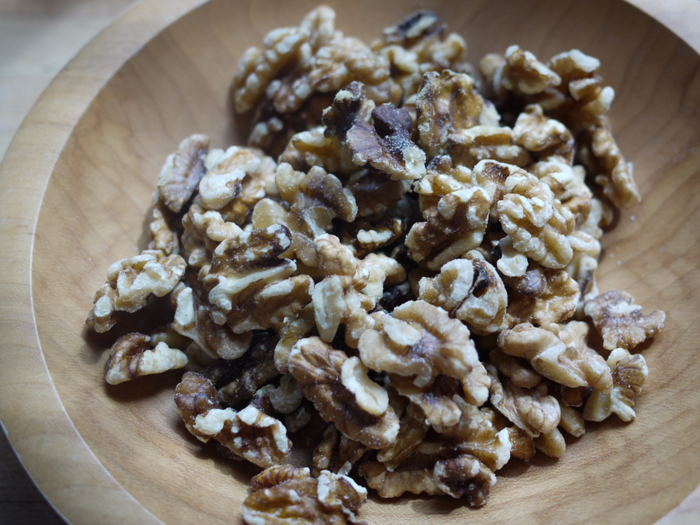
Nuts are a great high-fat snack in general, but the health benefits of walnuts are unique.
They contain a kind of omega-3 fatty acid called alpha-linolenic acid (ALA), which is also in flax seeds, soybeans, hemp, and chia seeds. It's one of two essential fatty acids that the body can't produce on it's own (the other is linoleic acid).
Tofu

People don't typically think of tofu as a high in fat, but it's a nutritional wonder — a complete protein source bursting with good fat.
Just half a cup of the soybean curd can provide you with 20% of a day's recommended protein intake and 6 grams of fat (and less than a single gram of that is saturated).
Edamame
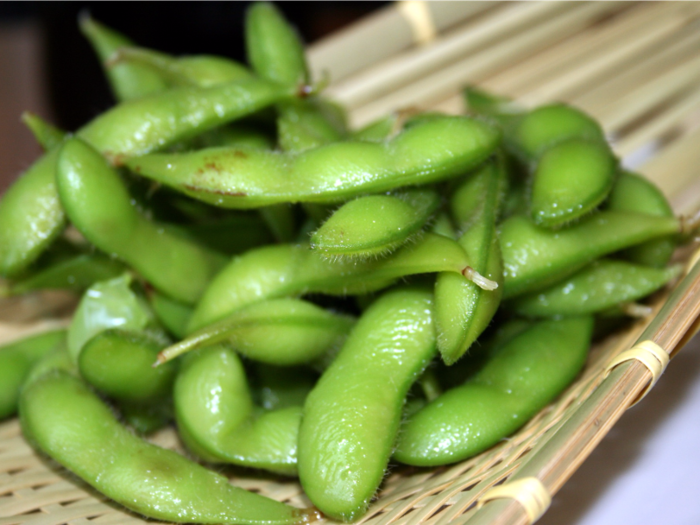
Like tofu, immature soybeans — or edamame — are a great source of fat. They're also high in fiber and protein, and can be good for aging bones.
A single cup of cooked edamame will fill you up with eight grams of fat, but only a single gram is the saturated kind. The beans are also a good source of magnesium, potassium, and iron.
Olives

Olive oil gets promoted as a source of high-quality fat, and it's a staple of many dietitians' favorite Mediterranean Diet, but where do you think it comes from?
Olives have a special kind of healthy fat named after them: monounsaturated oleic fatty acid, which can reduce your risk of developing heart disease.
Consuming olive oil is a way to get more oleic acid and essential linoleic acid into your diet.
Full-fat dairy

It may seem counterintuitive, but eating more heavy, full-fat dairy products can be a great way to stay healthy and trim.
A study of more than 3,700 healthy adults revealed those who ate more whole-fat dairy were more likely to have higher levels of the fatty acid trans-palmitoleate in their bodies. That, in turn, corresponded with slightly trimmer waistlines, less fat tissue, and more of the good kind of (HDL) cholesterol.
A much larger study of nearly 27,000 people from ages 45 to 74 found that participants who ate more high-fat dairy had the lowest diabetes rates.
"Those who ate the most high-fat dairy products had a 23% lower risk of developing Type 2 diabetes than those who ate the least," study author Ulrika Ericson said in a statement.
That wasn't true for people who ate more meat, which was linked to an increased risk of Type 2 diabetes, regardless of the fat content.
Fatty fish like tuna and salmon

Fatty fish are filled with essential omega-3 fatty acids that can reduce the amount of fat in your blood, lower blood pressure, and keep your heart healthy.
The American Heart Association recommends adding salmon, mackerel, herring, lake trout, sardines, or albacore tuna to your diet a couple times per week.
Wheat germ
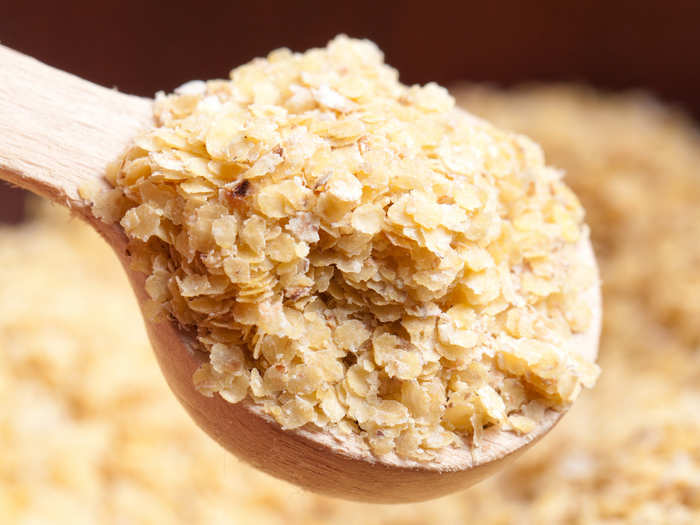
Wheat germ is the meaty inner heart of a wheat kernel — the embryo that germinates to grow into a fully developed plant. Unfortunately, it is often stripped away in the creation of processed foods to help them last longer.
Wheat germ has tons of fiber and boasts some fat, too (about 1.4 grams per cup, most of it unsaturated). Some people sprinkle it on their cereal in the morning, or top fruit or yogurt with wheat germ for an extra nutrient-rich crunch.
Unsaturated cooking oils, especially olive oil
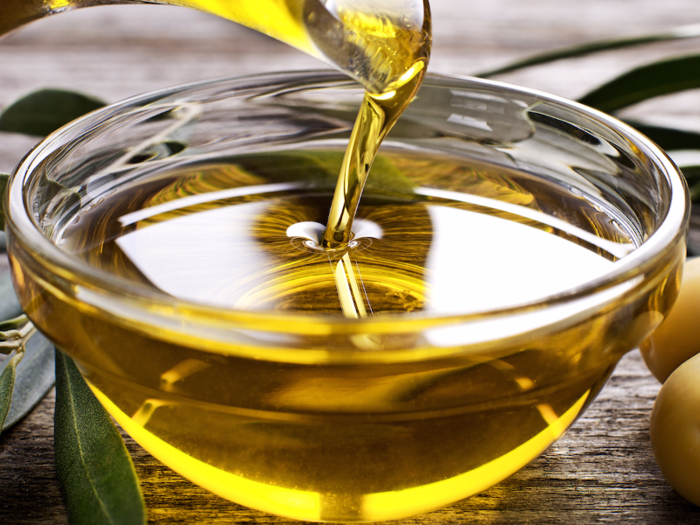
The kind of oil you consume can make a big difference to your heart.
Monounsaturated fats can actively lower your level of the bad (LDL) type of cholesterol. They're called "mono" because the fat molecules have just one unsaturated carbon bond.
Oils like olive, peanut, and sesame are all high in monounsaturated fat, but there's a lot of good research behind olive oil in particular.
People who use olive oil in their kitchen instead of going low-fat have been shown to have a lower risk of developing a heart attack, stroke or deadly heart disease. In one long-term study of 145,000 women, those who consumed at least a tablespoon of olive oil every day had a 10% reduced risk of developing adult diabetes.
And of course, avocados
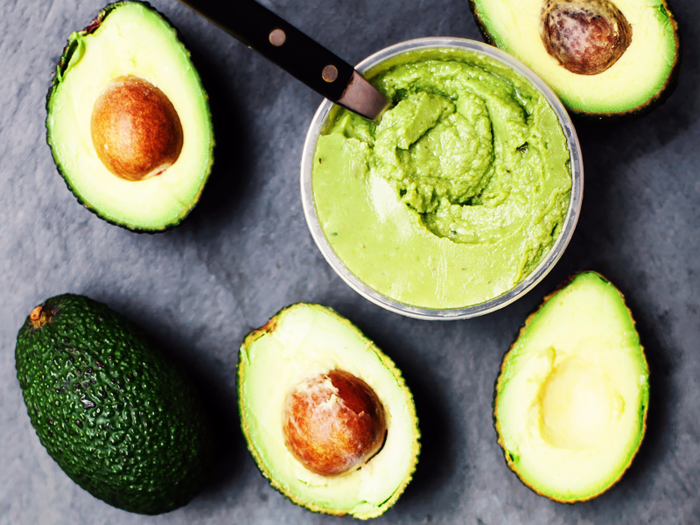
What would a list of healthy fats be without the darling fat of our times, the humble avocado?
A cup of the creamy green fruit has a whopping 14 grams of monounsaturated fat, along with smaller doses of polyunsaturated (2.7 g) and saturated fat (3.1 g).
In addition to fat, fiber, and protein, avocados are a great way to get potassium, which is a natural antidote to salt and can help maintain healthy blood pressure levels.
So go enjoy a little more fat today. Just make sure you're eating rich, filling, healthy fats that will treat your body right.
Popular Right Now
Popular Keywords
Advertisement